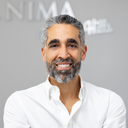Should I have breathing problems after rhinoplasty? (Photo)
I have problems breathing through nose ive had 2 rhinoplasties i just want my breathing back to normal i just dont know what doctor to trust
I have problems breathing through nose ive had 2 rhinoplasties i just want my breathing back to normal i just dont know what doctor to trust


What’s trending? Who’s turning heads? Which TikTok myths need busting? We’ve got you. No fluff, no gatekeeping—just real talk. Get our free, unfiltered newsletter.